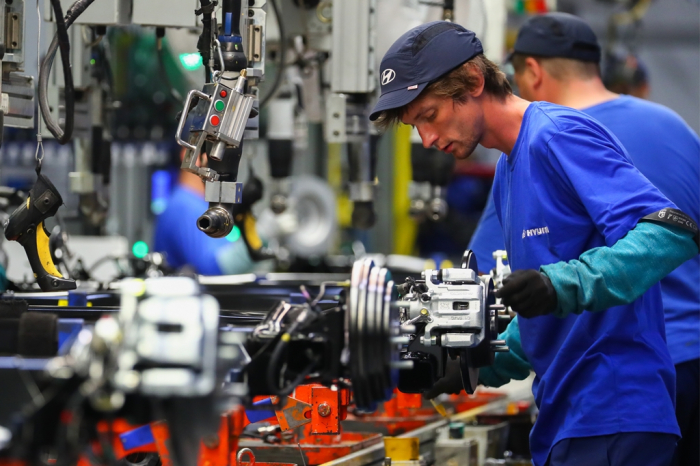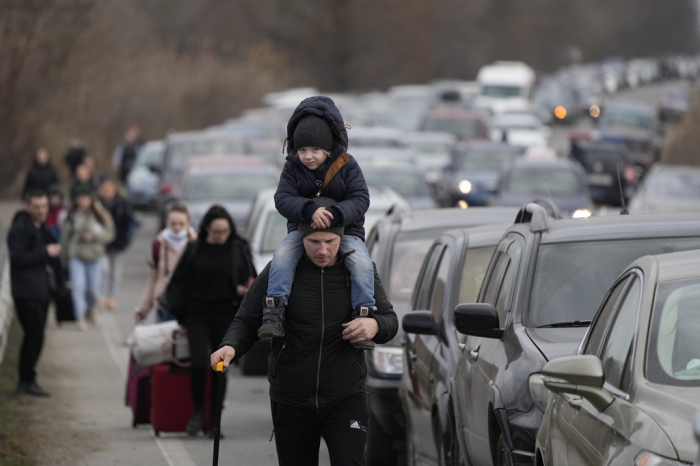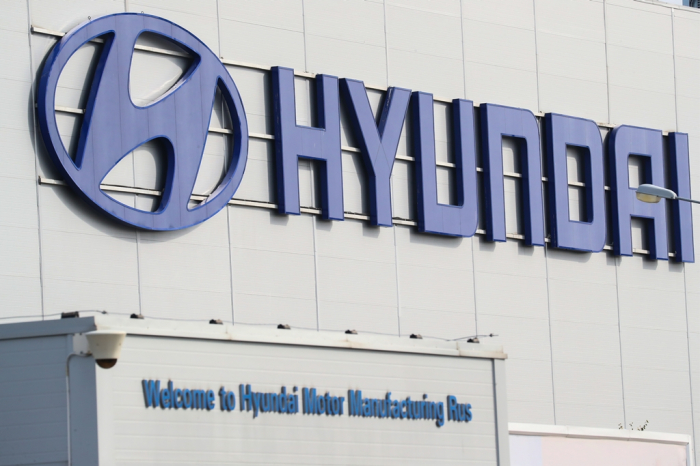Automobiles
Hyundai, Kia heavily exposed to Ukraine crisis; shares at 52-week lows
While negatives outweigh positives, analysts say the current troubles are largely reflected in their share prices
By Feb 28, 2022 (Gmt+09:00)
3
Min read
Most Read
Alibaba eyes 1st investment in Korean e-commerce platform


Blackstone signs over $1 bn deal with MBK for 1st exit in Korea


OCI to invest up to $1.5 bn in MalaysiaŌĆÖs polysilicon plant


Korea's Lotte Insurance put on market for around $1.5 bn


NPS loses $1.2 bn in local stocks in Q1 on weak battery shares



Shares of Hyundai Motor Co. and Kia Corp. on Monday fell to their lowest levels in more than 52 weeks as investors engaged in panic selling on concerns that the two top South Korean automakersŌĆÖ heavy exposure to the Ukrainian crisis might hurt their profitability.
The two carmakers will come under added pressure if the recent spike in oil prices and the protracted automotive chip supply constraints dampen consumersŌĆÖ appetite for new cars, analysts said.
ŌĆ£Under intensified sanctions against Russia, the US and Europe have decided to exclude Russian banks from the global financial settlement system SWIFT. This could make it hard for Hyundai and Kia to receive money from their sales in Russia as well as export their cars bound for Russia,ŌĆØ said Samsung Securities auto analyst Lim Eun-young.
On the Korea Exchange, shares of Hyundai Motor fell as much as 3.5% in the early Monday morning session to a fresh 52-week low of 168,000 won. After news that Ukraine agreed to talks with Russia, however, the stock rebounded to finish Monday up 0.6% at 175,000 won.
Nevertheless, Hyundai has so far this year declined more than 16% and shed nearly 30% over the past year.
Kia, HyundaiŌĆÖs sister firm, also fell to a new 52-week low of 71,500 won at one point on Monday before closing the day flat at 73,800 won. The broader Kospi market ended 0.8% higher at 2,699.18.

SECOND-HIGHEST EXPOSURE TO RUSSIA
According to IHS Markit, Hyundai and Kia, both under the wing of Hyundai Motor Group, accounts for 27.2% of RussiaŌĆÖs vehicle production, representing the second-highest exposure to the European country, following Renault GroupŌĆÖs 39.5%.
German automaker Volkswagen has a 12.2% share of the Russian market, followed by Toyota Motor at 5.5%.
Hyundai Motor Group has since 2010 been running a manufacturing plant in St. Petersburg, building some 250,000 units of cars annually.
In 2020, it also acquired a General Motors factory with an annual production capacity of 100,000 units in the port city on the Baltic Sea. At the plant, Hyundai also produces the Kia Rio, a subcompact sedan.
Samsung Securities analyst Lim said Hyundai Motor and Kia will suffer losses of 200 billion won ($166 million) and 250 billion won, respectively, from the current Ukrainian crisis. The losses represent about 5% of their annual net profit.
NH Investment and Securities Co., which recently cut its target price for Hyundai Motor to 270,000 won from 300,000 won previously, said the brokerage expects HyundaiŌĆÖs first-quarter operating profit to fall 3% from the year-earlier period due to the rising raw material prices, continued auto chip shortages and the Russian-Ukrainian conflict.
Korean automakers and their global peers have been placed on high alert following RussiaŌĆÖs invasion of Ukraine last week.
According to Reuters and other media outlets, FranceŌĆÖs Renault will suspend production at its assembly plant in Moscow next week due to ŌĆ£forced change in existing logistic routesŌĆØ that are causing component shortages.
Russia accounts for about 8% of RenaultŌĆÖs global auto sales revenue as its second-largest vehicle market after France.

RISING CAR PRICES BODE ILL
Analysts said Russia's invasion of Ukraine presents a substantial risk to the recovery of global light-vehicle sales this year.
Auto industry consultants J.D. Power and LMC Automotive on Friday slashed their sale forecast by 400,000 to 85.8 million units, also citing rising oil and aluminum prices that could discourage buyers from spending on new cars and trucks.
Last week, Russia's attack on Ukraine caused oil prices to surge to more than $100 a barrel for the first time since 2014, with Brent touching $105.
The auto industry is still grappling with a global chip shortage that has forced them to cut back production throughout last year.
Samsung analyst Lim said the Ukrainian crisis has largely been reflected in the current share prices of Hyundai and Kia.
ŌĆ£The production of automobiles is shackled by chip shortages globally. Hyundai and Kia can divert their Russian export volumes to other regions where demand is still strong. Share prices of the two carmakers wonŌĆÖt likely fall significantly from the current levels unless the Russian crisis deteriorates,ŌĆØ she said.
Write to Jae-Won Park and Il-Gue Kim at wonderful@hankyung.com
In-Soo Nam edited this article.
More to Read
-
 AutomobilesHyundai IONIQ 5, Kia EV6 rated top among electric cars in Germany
AutomobilesHyundai IONIQ 5, Kia EV6 rated top among electric cars in GermanyFeb 28, 2022 (Gmt+09:00)
2 Min read -
 Business & PoliticsPerfect storm from Ukraine crisis clouds Korea Inc.ŌĆÖs outlook
Business & PoliticsPerfect storm from Ukraine crisis clouds Korea Inc.ŌĆÖs outlookFeb 25, 2022 (Gmt+09:00)
4 Min read -
 EconomyS.Korea to support firms to offset damage of Ukraine crisis
EconomyS.Korea to support firms to offset damage of Ukraine crisisFeb 25, 2022 (Gmt+09:00)
2 Min read -

-

-
 Electric vehiclesHyundai to debut IONIQ 6 in July to rival Tesla Model 3
Electric vehiclesHyundai to debut IONIQ 6 in July to rival Tesla Model 3Feb 07, 2022 (Gmt+09:00)
2 Min read
Comment 0
LOG IN


